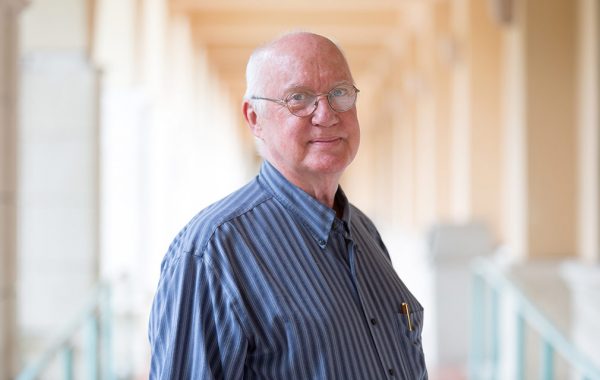Gregory Bush ’71
A father offers a brighter future to young adults with intellectual disabilities.
When his vivacious daughter, Paula, graduated from high school nearly a decade ago, Gregory Bush ’71 made a disappointing discovery: There were few job training or continuing education options for the thousands of young people in Florida like her with intellectual disabilities. As many are in this population, Paula is on the autism spectrum.
“They’re dumped, forgotten, and lost,” said Bush. The unemployment rate in South Florida bears that out: More than 75 percent of young adults like Paula are jobless, despite the fact that they have so much to offer, he said.
Paula had two options. She could attend a state-funded vocational rehabilitation program focusing on highly technical jobs, a program that many students fail at because they lack certain social and life skills. Or, she could attend adult daycare, which teaches simple, repetitive tasks to a lower-functioning population.
“There was an intermediate phase missing,” said Bush, a modern U.S. history professor at the University of Miami. So in 2007, he started Nature Links for Lifelong Learning, a small nonprofit program serving adults ages 18–30 that puts nature at the center of their education.
“We want to keep their curiosity alive,” said the enthusiastic Bush, who is president and chief fundraiser. Nature Links has two programs during the school year: Urban Explorers and Culinary Foundations, which run three days a week, five hours per day.
In Urban Explorers, based at the Frost Science Museum, students learn to use public transportation, read maps, visit local museums and the zoo, create videos, and hear presentations on topics ranging from hydrology to endangered species. Culinary Foundations teaches basic cooking skills, safety and hygiene, and how to grow food in a garden.
“This program has helped my daughter completely open up,” said Jackie Saavedra, whose daughter Kathrina, 29, has been with Nature Links for several years. “She used to be very shy and wouldn’t communicate if she didn’t know you. Now she wants to engage with people and she wants to be a chef. Nature Links really opens their minds.”
Another participant interns at the Frost Museum, where he researches exhibitions and the classification of materials. “He has an amazing understanding and memory of certain things; they love him,” Bush said.
Nature Links is starting a more extensive program with Frost so students can learn to be docents or interns. Bush is also developing a partnership with Zoo Miami that could include caring for and growing food for the animals. In addition, he envisions adding more community gardens, expanding the culinary program to new Nature Links locations, and opening a Nature Links restaurant run by the students.
A third program is also in the works: Environmental Teamwork and Wildlife Education, which will partner with Zoo Miami, the City of Palmetto Bay, and Homestead Hospital.
A history major at Colgate who earned his master’s in American history from George Washington and a PhD at Columbia University, Bush is a longtime Miami activist who has fought hard to preserve local open space. He is vice president of the Urban Environment League of Greater Miami; author of a new book, White Sand Black Beach: Civil Rights, Public Space, and Miami’s Virginia Key, about a once-segregated beach; and chair of the City of Miami’s Virginia Key Advisory Board.
“I try to build better coalitions to do good things with overlooked populations and public spaces,” Bush said. “I’ve learned a lot of political history over the years, and I’ve tried to apply that to saving parks and starting needed organizations. Like so many other issues, Nature Links is a civil rights issue for me.”
— Anne Stein







